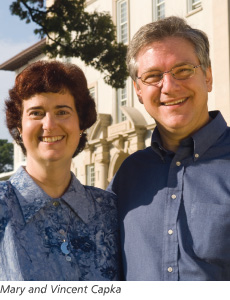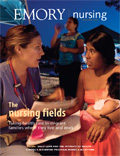Through sickness and health
|
|

by Dana Goldman
Mary and Vincent Capka have spent their 20-odd years together making complex and difficult decisions. First and foremost was how to deal with Mary’s polycystic kidney disease, a genetic disorder that already had claimed the lives of her mother and a brother. Out of that came another hard choice not to have children.
Then, when Mary’s kidney function began to deteriorate about 10 years ago, Mary, a nurse and director of education at two Emory hospitals, opted for a pay cut and a less stressful part-time job as coordinator of employee credentialing for Emory Healthcare. And then two years ago, Vincent, a retired software developer and researcher, made a personal decision to donate a kidney to Mary.
If both their lives have been complicated, the couple says their recent decision to give money to the nursing school was, in comparison, easy. A $20,000 scholarship will support a master’s level nursing student for one year, with a preference toward current Emory employees interested in becoming transplant nurses. So was establishing a fund for additional nursing scholarships in their wills.
"It seemed like the right thing to do," says Mary. That’s because, until her retirement in October, Emory was not only her employer of 30 years, but her educator, benefactor, and healer.
After working her way through college in the 1970s, Mary came to Emory University Hospital as a staff nurse. She intended to take classes toward her master’s in nursing while working full-time. Then those plans changed for the better, when the School of Nursing offered Mary a fully funded traineeship.
"Getting this traineeship was a godsend," says Mary now. "It allowed me to do the entire program in one year, something I otherwise couldn’t do."
The Capkas’ goodwill toward Emory continued to grow. While Mary’s doctors continued to monitor her kidney function, two other family members who also had polycystic kidney disease came to Emory for successful transplants. When it was her turn, in October 2006, she and Vincent felt ready.
"The Emory transplant team is incredible," says Mary. "There was tremendous comfort and security in our caregivers. We knew things could go south, but we just knew they had an incredibly good reputation."

That reputation was well deserved. "It’s a great group of people," says Vincent. "The staff was tremendous." His experience was so positive that Vincent now volunteers every week on the transplant unit at Emory University Hospital.
Now Mary, newly healthy, is planning on joining him. They hope that through their presence with transplant patients and families, they can provide reassurance—physical proof that there’s life after surgery and a failing organ.
Most of those patients won’t know the Capkas’ other role as nursing school benefactors. But that doesn’t matter to the couple. Through the scholarship, the Capkas simply hope they can set the stage for more transplant nurses to be trained at Emory—and to stay with Emory Healthcare.
What it comes down to, says Vincent, is paying forward a little bit of what they’ve received from the nursing school. "They helped us," says Vincent. "Now I’d like to help them."
His wife shares the feeling. “After the transplant, we said, ‘What can we do for Emory?’” Mary explains. “The best choice we could come up with was to help sponsor a student through the nursing program, preferably in transplant.”
On this, and most other things, she and her husband are on the same page, as if it’s not just a kidney they have in common. But that comes as no surprise to Mary. “I knew I’d be compatible with him in more ways than one,” she says, smiling. —Dana Goldman



